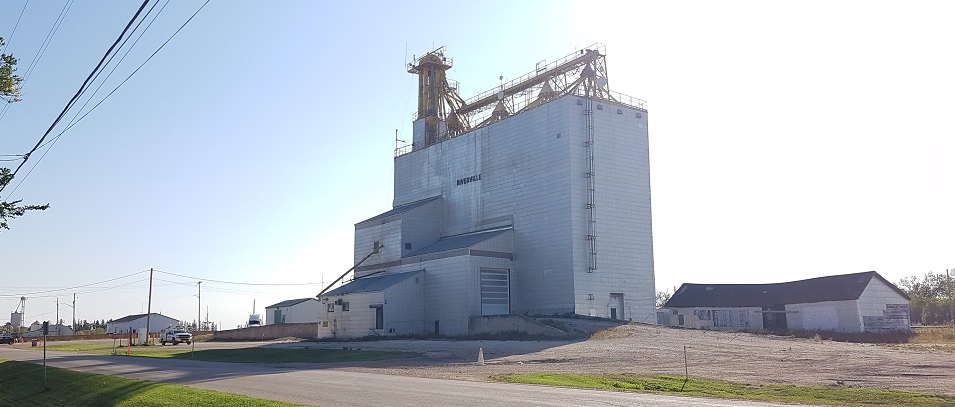
It’s the end of an era for the town of Niverville. The former Manitoba Pool elevator along the railroad tracks will be coming down in the next month or two.
Grant Dyck of Artel Farms is the current owner of the property and is keenly aware of the elevator’s significance. As a lifelong farmer, he respects and appreciates both the purpose and symbolism of grain elevators.
But he says the time has come for the building to be demolished.
The History of Local Grain Elevators
Grain elevators have a storied history in the prairies, and Niverville holds a special place in that history.
In 1879, William Hespeler built a grain elevator in Niverville and it was the first in all of Western Canada. That original building was the first in a string of elevators built in the same spot, and it remained in use until 1904, although it wasn’t demolished until 1923.
In 1904, a new elevator was built next to the one that stands today. This was used until 1938, at which time it too was taken down and a larger, more modern facility was built. Around 1942, an annex was added to this building to create more space, allowing the elevator to be used for another five years.
Manitoba Pool built a new elevator in 1966 and used the older one for storage. They later added an annex to this building as well. On November 26, 1980, the entire complex burned to the ground.
The current facility was opened on December 4, 1981 and served as one of the last of its kind.
“At the time of its creation, it was among the largest of the wood-only, open-roof construction style elevators,” Dyck says. “It was built by a crew of local men that literally nailed it together from the ground up… Someone who remembered the original building project mentioned to me that it had taken 27 rail car loads of lumber and one full rail car load of nails as building material.”
Dyck purchased the Niverville elevator in 2001 and attempted to buy the elevator in Ste. Agathe as well. But by that point, he says, the grain companies would have rather seen the buildings torn down than risk creating more competition.
At the time, he adds that the agriculture industry was in a consolidation phase. Many of the smaller elevators were sold off or torn down. Manitoba Pool alone got rid of 117 elevators.
During that period, the rail companies were also trying to gain efficiency by focusing on larger high-throughput facilities with rail spots that could handle an entire train.
Reasons for Demolition
Now, after 20 years of owning the Niverville elevator, Dyck says that there are three primary reasons it will no longer be used.
First of all, it’s comparatively very small.
“One bin at our facility is actually the usable capacity of the entire existing elevator, consisting of 45 individual bins,” Dyck says. “The Niverville facility is a 4,000-tonne, or roughly 160,000 bushels, building. The ones that you see along Highway 75 are around the million-bushel mark for capacity. Our rail siding can handle 16 cars. Those high throughput facilities have sidings that can handle 120. When a train comes, they often load them in 24 hours. Over the years, it has become increasingly difficult to get the CP rail to bring us cars, coming to a head in recent years when they made it financially impossible, pricing the option out of feasibility.”
The second reason Dyck believes the elevator needs to come down is its access points. Niverville has been growing rapidly over the past few years and this naturally means that there are more people, more buildings, more streets, and especially more traffic.
“For instance, there is no farm equipment going down Main Street anymore because as producers we are all keenly aware of the road safety concern,” Dyck says. “It’s much the same with the elevator. A facility like ours needs to be turned—which means to fill and empty or continually use. The worst thing to do for these old elevators is to ‘fill and forget.’ At the height of Artel Farms’ use of the elevator, there was a year where we turned the plant seven times. For perspective, that means almost one million bushels would go in and out of it within a year. Doing that required 700 to 800 trucks coming in just to fill, never mind the traffic going out if it didn’t go on rail. All of that happened within a three-month window, presenting a safety issue with large trucks on Main Street and what is now a very tight corner to get to the elevator.”
The final reason the elevator needs to come down is a lack of people knowledgeable in how to maintain it.
“I have spent many months ‘bartending’ grain in the facility,” he says. “To be honest, I am a little sad to see it go as well. However, I have come to realize that even running a plant like this has become something of a lost art. There is so much to know, and it requires a bit of intuition with this style of building. It has become a difficult thing to train or teach. We have had some fantastic people work with us over the years who took that challenge on, but it is by no means glorious work. In fact, it can present some of the worst jobs at the farm when things go wrong.”
White Elephant
Over the years, Dyck considered selling the elevator multiple times. He felt that its convenient rail access and relative rarity would make it saleable. But each time he considered a sale, he realized that it wouldn’t be what was best for the town.
Dyck even considered the possibility of using the elevator for another purpose.
“With smaller sites, people have tried to turn them into restaurants, bed-and-breakfasts, etc.,” he says. “However, the largest challenge is that it needs constant maintenance and presents a large safety concern if not used. The best way to keep it in good shape is to have grain going through it. Over the years, as the town has grown, we have come to use it less and less.”
The facility is, when not in use, a significant safety hazard. A massive wooden structure is clearly a fire risk. Also, Dyck says it has become a rite of passage for teenagers to try to break in and climb to the top. Dyck fears for the safety of these children and doesn’t want to even imagine what could happen to a child who tried to climb the structure.
Dyck says that it isn’t even feasible to consider making the elevator a heritage site.
“The sheer cost to procure it and maintain it would not make sense,” Dyck says. “Frankly, I don’t think it would be the best thing for a booming community like ours. So it becomes a bit of a white elephant. We can’t continue to use it, and we can’t sell it for its intended purpose.”
It isn’t lost on Dyck that Niverville had the first grain elevator in Canada, and now arguably it has one of the last of its kind today
“The original one is gone and it is difficult to find any mention of that one’s last days as things progressed and expanded,” he says. “It seems fitting that this one gets a page in history now.”
Dyck points out that his business, Artel Farms, has a regularly expanding footprint east of town.
“Our town will always have what it started with, a state-of-the-art grain handling facility,” he adds. “The places we store grain may look different today, but only as the farmers using them have different requirements.”
When this elevator was built in the early 80s, the corner it was on was still a quiet one on the outskirts of town. The noise and dust it produced when it was in use weren’t a problem.
Over the last 20 years, Dyck says the elevator has been used less and less, so he can only recall a handful of complaints about the dust or noise from loading rail cars. If the elevator were being used to its full capability, he believes there would have been many complaints as the corner is now a bustling one.
“Again, that is the reason we intentionally used it less and less over the years and chose to build our drying site, not on our farm or at the elevator, but considerably further out of town,” Dyck says.
Wood Purchase
There has been some interest in the purchase of the wood from the building after it’s torn down. Dyck says there is a lot of good wood to be used, although it is held together with so many nails that he feels it may not be a worthwhile undertaking to get useful material from it.
He says there has also been some interest in procuring the wood for wood boilers.
There will be a specialist arriving in town to deal with the demolition of the site. Dyck says this expert is one of the last and best at taking down elevators safely and quickly. The specialist operates throughout western Canada and has done this job dozens of times.
Property’s Future Use
Dyck is working with the Town of Niverville and the property’s listing agent, Clarence Braun, to determine how best to use the site once the elevator is demolished.
Braun says that it’s a large plot of land but rather long and narrow, over 550 feet long, so not ideal for just anything. He has begun showing the location to prospective buyers but is not yet aware of anyone’s specific plans or thoughts for the plot.
The elevator is, of course, right next to the railway tracks, and the side line that is located there will continue to be a critical one even when the elevator is gone. Braun says that the side line in Niverville is the main area between Niverville and Emerson where CPR can park their trains while the railroad lines are serviced.
“Indeed, it is the end of an era,” Dyck says. “However, I never would have thought our grain elevator would overlook a brand-new school and rec centre. It’s all quite impressive, what’s going on around us. Having a farm and elevator in the town has presented challenges, but also opportunity. We are trying to figure out our place in all of it.”




















